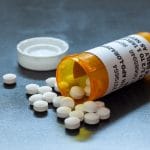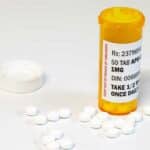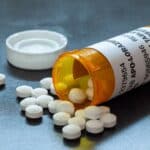Lorazepam (brand name Ativan) is a benzodiazepine prescription drug that can result in a life-threatening overdose, especially when taken in large quantities or used with other drugs like opioids or alcohol.
Ativan & The Risk Of Overdose
Ativan is a central nervous system depressant used for a number of health issues such as:
- anxiety
- alcohol withdrawal symptoms
- insomnia
- seizures
- sleeping difficulties
Ativan works by increasing the levels of gamma-aminobutyric acid (GABA) in the brain. This suppresses the central nervous system (CNS) and produces a sedative effect which is helpful for those struggling with anxiety disorders.
However, due to the sedative nature of Ativan, there is a serious risk of overdose in those who participate in this substance abuse.
Ativan Overdose Symptoms
According to the United States Food and Drug Administration (FDA), there are a number of symptoms associated with an Ativan overdose.
Although some of the side effects of taking Ativan can be extremely heightened when an overdose occurs, there are other specific symptoms that can take place.
Mild Overdose Symptoms
Some of the mild overdose symptoms may include:
- drowsiness and sedation
- lethargy
- paradoxical reactions
- dysarthria
- mental confusion
Severe Overdose Symptoms
Some of the more life-threatening Ativan overdose symptoms may consist of:
- shallow breathing
- cardiovascular depression
- ataxia
- hypotonia
- low blood pressure
- hypnotic state
- hypotension
- extreme sleepiness
- coma
- death
Those who crush the tablet to snort the drug or combine the powder with liquid and inject themselves with Ativan may find the side effects of overdose more severe. This type of substance abuse can lead to fatalities.
Ativan Overdose & Polydrug Use
Some overdoses that involve Ativan may involve other drugs as well. When various medications are combined, serious drug interactions can take place.
When other CNS depressants are combined with a benzodiazepine, shortness of breath, shallow breathing, and unresponsiveness can occur. There are a number of medications you should avoid while taking Ativan, as adverse reactions may take place, leading to a benzodiazepine overdose.
Some of the medications and substances to avoid while taking Ativan include:
- alcohol
- other benzodiazepines such as clonazepam (Klonopin), diazepam (Valium), and alprazolam (Xanax)
- supplements and vitamins
- antihistamines
- barbiturates
- muscle relaxants
Ativan & Opioids
Although many different medications may cause interactions, the National Institute on Drug Abuse (NIDA) explains that those who take opioids in combination with Ativan are more likely to experience a fatal overdose.
In fact, this type of opioid and lorazepam overdose can lead to serious respiratory depression, coma, and impaired cognitive functions.
Whether it’s a prescribed medication which contains opioids or an illicit drug such as heroin that’s combined with Ativan, this substance use can result in an overdose death.
Treatment For An Ativan Overdose
If a person suffers from an Ativan addiction or excessive Ativan use, there are a number of treatment options that may need to be considered. When it comes to treating an Ativan overdose, there are a variety of protocols and options which should be considered.
Immediate Treatment
If you suspect an overdose has occurred, contact 911 immediately. When you arrive at the hospital, a healthcare provider may use flumazenil, a drug which can help reverse the effects of a benzodiazepine overdose.
Those who overdose on Ativan with other drugs in their system may be more at risk of a life-threatening overdose. Your doctor may assist you during this process to help prevent a lethal overdose.
Addiction Treatment
Taking excessive lorazepam may lead to dependency and withdrawal symptoms when you stop use. Some may develop a substance use disorder and an addiction due to the high doses taken.
As you undergo addiction treatment, one of the first stages of the process is detoxification.
With detox, your body releases the toxins from your body. During the detox process, you will be closely monitored by a healthcare worker.
Aftercare
There are a number of treatment programs that focus on both physical and mental health. Among the many treatment options includes aftercare, which can consist of group therapy, 12-step programs, and other treatment considerations.
Get Help Today
If you or a loved one are struggling with drug use, contact Northeast Addictions Treatment Center for information on our outpatient treatment options.
Sources
Written by
Northeast Addition Editorial Team
©2024 Northeast Addition Center | All Rights Reserved
This page does not provide medical advice.




